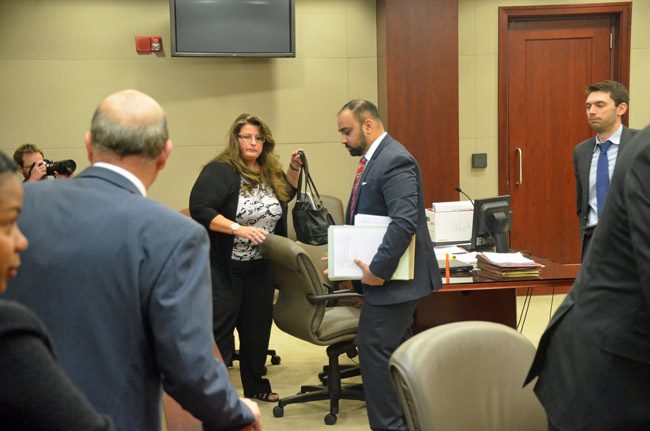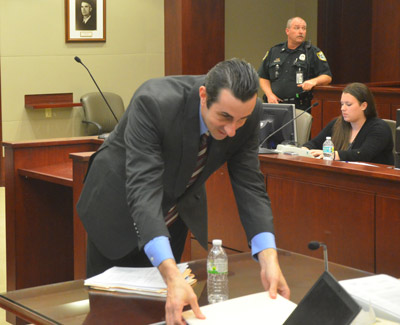
For the nearly two years that Kimberle Weeks, the former Flagler County Supervisor of Elections, has been battling felony charges over allegedly illegally recording conversations, her lawyers have been deft at defusing, delaying and dismissing various parts of the case.
They’ve managed so far to drag the criminal case through 21 months. They’ve had three of its 12 third-degree felony charges thrown out. They’ve been arguing and re-arguing a motion to suppress the search warrant that started it all. Today, in tandem with that motion, they argued to have all charges dismissed. (See the details in a separate story published earlier.) The arguments on the two motions were all but done by 2 this afternoon when the prosecution scored a win of its own, confounding Weeks’s lawyers, who were reduced to stumbling through a request to the judge for a continuance so they could formulate their answer to what, from all appearances, they were not prepared for, but should have been.
Assistant State Attorney Jason Lewis wanted Weeks, who was in the courtroom by her lawyers, to testify.
A clever counterpunch from the prosecution puts Weeks’s lawyers off-balance.
Lewis can’t compel a defendant to testify. And as a defendant, Weeks has the right to remain silent. But her lawyers were arguing a motion to suppress the search warrant that uncovered the recordings at the center of the criminal case. To do that, Lewis argued, Weeks herself must have standing for the argument to be valid. In other words, she must tell the court that the devices involved in the search–the cell phones, the computers, the hard drives–were hers, and hers alone, thus giving her the right to contest the validity of the search warrant.
The evidence was taken from devices at the Supervisor of Elections’ office, some or all of which may or may not have been exclusively accessible to Weeks. If, for example, evidence came from a computer that was also accessible to other employees in the office, then Weeks doesn’t have standing to contest the search warrant in that instance, because she can’t claim sole ownership of that device, Lewis explained. And Weeks herself established that she did not have sole ownership of certain devices when she had her husband bring a personal cell phone to the attention of Florida Department of Law Enforcement inspectors–the agents who served the warrant–which, to Lewis, indicated that she knew the distinction between her personal devices and those belonging to the office.

The validity of the search warrant is key, because if the warrant is suppressed, then all the evidence gathered subsequently is invalid. It can’t be admitted in court. And the prosecution’s case collapses.
Weeks could well have taken the stand this afternoon and simply said: these devices are mine, thus giving her standing, and returning the motion to its essentials, as argued earlier.
“Their client is here, she can take the stand, they just don’t know what she’s going to say,” Lewis said.
And that was just it: her lawyers didn’t know what she’d say, and at that point it’s not at all clear that Weeks would have known what to say: she has not wanted to be part of any testimonies. “I’m looking fully at my client’s right to remain silent,” Ali said.
Weeks could not simply claim that all devices were hers since it’s established in parts of the record that others had access to at least some of the equipment in the office (and in an interview after the hearing, Lewis raised the tantalizing possibility that even the current supervisor of elections, Kaiti Lenhart, could be called to testify about who had and did not have access to certain devices, since Lenhart was the tech specialist in the office. “Anything is possible,” Lewis said.) But if others did, then the defense’s motion to suppress is eviscerated.
Ali could find ways to establish Weeks’s standing through other witnesses, but the defense would have to prepare for that. So he asked the judge to continue today’s hearing and set yet another one do do just that. Lewis was reluctant. So was the judge, as neither wanted to bring back for a third time Philip Lindley, the FDLE inspector (now retired and in less than ideal health) to testify about the warrant, as he did today. The compromise was that he’d be Skyped in at the next hearing, which was scheduled for Feb. 24 at 9:30 a.m.
Either way, Circuit Judge Margaret Hudson was not going to issue rulings either on the motion to suppress or on the motion to dismiss today. She does not issue such decisions from the bench, preferring to spend time formulating her judgment. But she said she is likely to issue her decision on the motion to dismiss the entire case at the Feb. 24 hearing. If she rules in favor of the defense, the entire case ends, at least for now. (The prosecution still has the right to appeal.) The motion to suppress the search warrant is made moot.
But it would be an extraordinary decision–and therefore an unlikely one–if Hudson were, in fact, to dismiss all charges. It is likelier that she will dismiss a few, some of which being quite weak (some of the recordings, while clearly inappropriately made, were made in settings that were just as clearly public). But it is unlikely that she will dismiss them all.
From that point on, the validity of the search warrant becomes the central issue before trial, should the case go that far. Along the way of course, the case’s twists and incidental revelations–like today’s–may change its dynamics. Until today, Weeks and her attorneys seemed to have the case well in hand. That was less certain when they left the courtroom. They, too, had witnessed the afternoon gait in Lewis’s step–and arguments.





























George says
This reads like a script from Law & Order, only more exciting because it’s real!